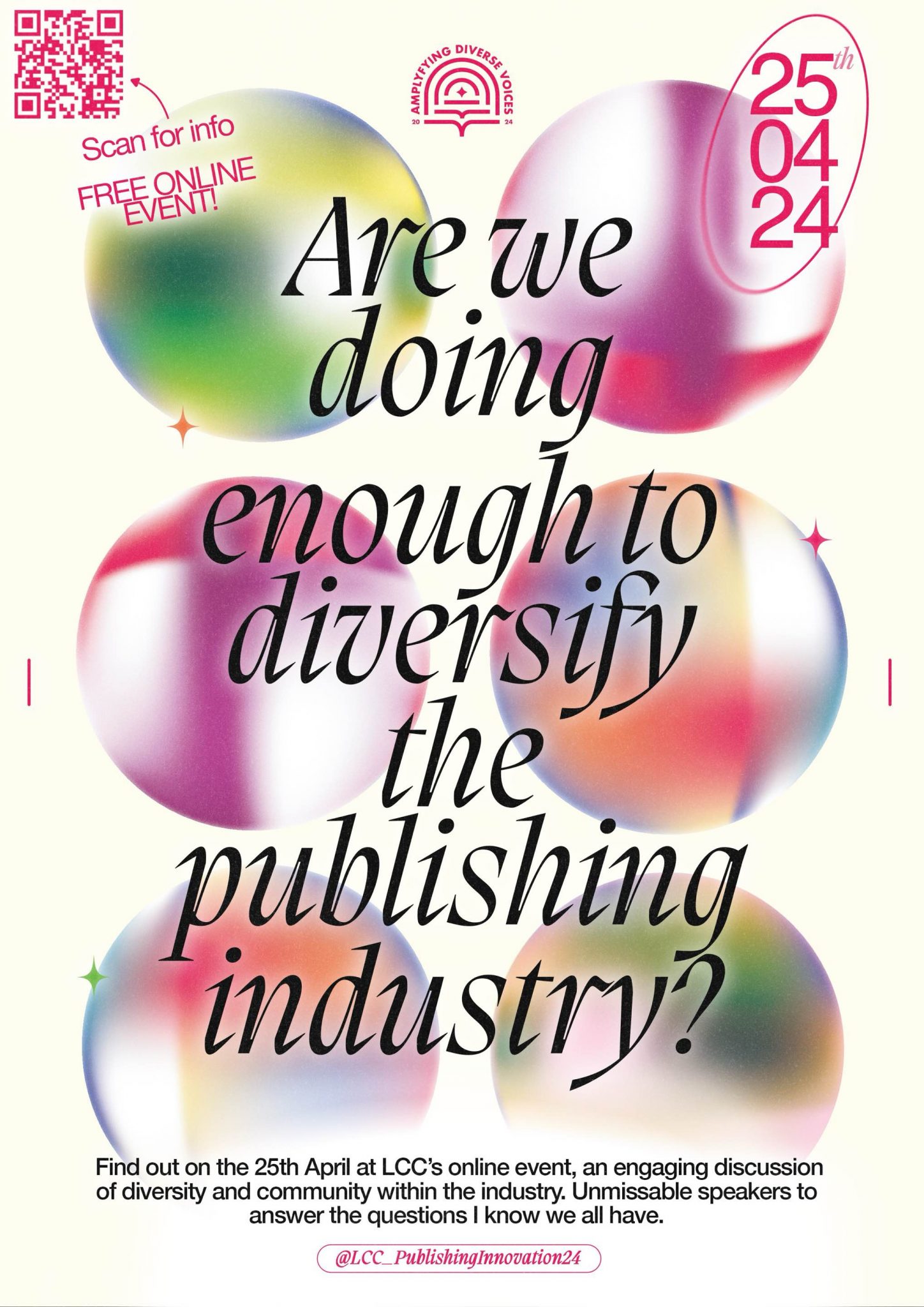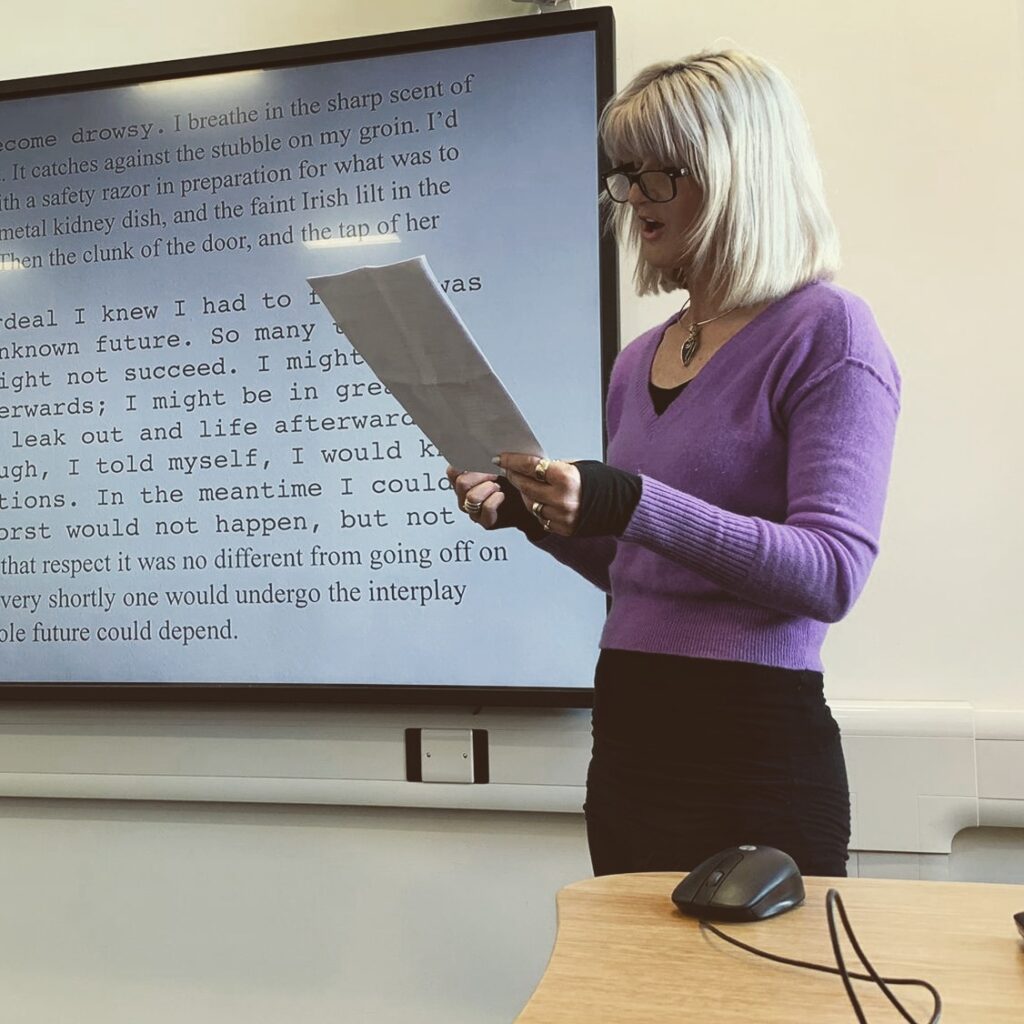Welcome to the our Post-Publishing Spring Newsletter! Please find underneath a selection of recent updates from Post-Publishing researchers. You can sign up to receive our newsletter here.

Peter Willis was invited to participate in ‘Amplifying Diverse Voices’, an event curated by MA Publishing students at the London College of Communication, and spoke about how self-publishing practices can be used to foster inclusion and create community. He also presented the paper ‘Duplicate, Copy, Print: Towards a Material History of the Zine’ at the symposium Selfing and Shelving: Zines, Zine Media, and Zintivism at the Johannes Gutenberg-University Mainz on the 3rd of May. The paper drew on archival research to outline some specific examples of zines’ relationship to their technologies of production over the last century, starting from the coining of the term ‘fanzine’ in 1940 up to the postdigital zines of today, in order to outline the ways in which contemporary zine production maintains and diverges from the ways zines have historically enacted their iconic properties of DIY, anti-mainstream, intimacy and intensity.

Maddalena Fragnito, together with Marco Baravalle, engaged in a conversation with the decolonial feminist thinker Françoise Vergès discussing the intersecting frameworks and rhetorics of art and its institutions, coloniality and the ongoing project of decolonization, and rapid climate breakdown. The resulting text ‘One Day, Freedom Will Be’ is available on the webiste of L’Internationale, a European confederation of museums, arts organisations and universities. Maddalena also published and article in the book Art for Radical Ecologies Manifesto edited by Marco Baravalle, Emanuele Braga, Gabriella Riccio, and Federica Timeto. The book delves deeper into the manifesto’s themes, discussing the integration of new and historical materialisms, identifying agents of change from a more-than-human perspective, strategising against censorship and artwashing, and offering a profound critique of extractivism and colonialism. The book was launched at the Venice Biennale as part of a panel discussion at the Gathering into the Maelstrom exhibition, with panelists including Maddalena, Françoise Vergès, Manuel Borja Villel, Ashley Dawson, Oliver Ressler, Raluca Voinea, Ovidiu Tichindeleanu, Francesco Martone, Andreco, Federica Timeto, Emanuele Braga, and Marco Baravalle. Maddalena is currently preparing for a talk together with the feminist activist and writer Lea Melandri at the Kunsten Festival Des Arts Bruxelles (18-21 May).

Clare Harvey presented at the Research Capability and Development Conference (RCAD24) at Coventry University in the panel ‘Positionings and Practicalities: Doing methods in gender research’ (alongside fellow CPC PGR Hannah Westwood) on 30th April. The feedback for all panellists was overwhelmingly positive, and prompted plenty of discussion. Clare is also facilitating writing workshops in libraries throughout Nottinghamshire this May, as part of Inspire Culture’s I Am A Writer programme of socially engaged events.

Simon Bowie wrote a short piece for the LSE Impact of Social Sciences blog discussing the 2023 cyber-attack on the British Library and what their recently published review paper can tell us about institutional devaluing of technical staff and outsourcing of key IT systems to corporate proprietary software providers. Following on from this, Simon was interviewed by a technology journalist from Il Post for a piece on the vulnerability of library and university systems in the UK and what it means for Italy’s cultural institutions. Simon and Janneke Adema were invited to deliver a talk to open Northumbria University’s Open Research Week on 18 March 2024. Their talk was called ‘Experimental Book Publishing: Tools, Practices, and Books to Promote the Publication of Experimental Scholarly Works’ and discussed experimental book publishing in the HSS as well as their work as part of Copim’s Experimental Publishing Group. Their presentation and a video walkthrough of the Experimental Publishing Compendium produced for this talk are available in Coventry University’s Pure repository.

Adeola Eze joined Coventry Classics in presenting her paper ‘Textual and Visual Interplay of Antiquity in Kathleen Fraser’s m ov a b le TYYPE’ at the largest Classical Association Conference in the UK held at the University of Warwick last March. This paper considers the role of ancient book formats as a model for the experimental structure and layout of Kathleen Fraser’s experimental poetry book m ov a b le TYYPE (2011). She also gave a talk at the Research Capability and Development Conference at Coventry University titled ‘Asemic Expressions in Contemporary Thought through Visual Language’ and presented the paper ‘Disrupting Conventions: Asemic Writing and its Connections to Ancient Textual Forms’ at this year’s Contemporary Artist Book Conference in New York on 9 May. Her paper explored the experimental and contemporary notion of asemic writing-writing without semantic meaning. It traces the origins of this form of writing to ancient times and challenges the notion that asemic writing is devoid of meaning by examining its inherent significance and potential for interpretation. Adeola also presented a paper at the University of Durham Cicero AwayDay on 16 May on ‘Cicero’s De re publica: bridging ancient texts and modern metaphors’, which looked at the rediscovery of Cicero’s De re publica in palimpsest form and the various interpretations of the same manuscript by different contemporary writers and how this reveals a non-authorial lens through which his works are perceived. Over the summer Adeola will be giving a talk at ‘The Next Generation of Classical Reception Studies: workshop for Postgraduate Researchers and Early Career Academics’ hosted by the St Andrews Centre for the Receptions of Antiquity (SACRA) and the Classical Reception Studies Network (CRSN).

Judith Fathallah led the research and development on the Open Book Collective’s Development Fund, which on 16 April 2024 launched its inaugural Call for Applications. This fund is to support projects related to the publication of open access scholarly books; work on the creation and support of infrastructures for the distribution, cataloguing and preservation of open access scholarly books; building and sustaining networks and advocacy for the support of OA scholarly books and infrastructure; and other projects building capacity for scholarly OA book publishing. The Call and guidance are available in English, Spanish and Portuguese and applications are welcomed in any of these languages. Designing the Call has been a collaborative process, involving consultation both with colleagues and partners involved in Copim’s Open Book Futures project and with wider stakeholders, as Judith describes in an accompanying blog post. The Call is open until 31 May 2024, and an optional scope check of project outlines is offered until 10 May 2024.

Janneke Adema was invited to give talks at Experiments in Radical Publishing with Charlotte Crofts (UWE/Screenworks), Ashwani Sharma (UAL/darkmatter), and Mark Peter Wright (UAL/CRiSAP), organised by the Sonic Screen Lab, London College of Communication, UAL, in London on 1 May, and at Wanting Better: The Practice of Publishing for Practice Research, with William Urricchio (MIT/Utrecht University), organised by Nick Thurston, at The Centre for Practice Research in the Arts (CePRA) at Leeds University, on 15 May. Janneke is also convening the roundtable ‘Experimenting with Academic Knowledge Production’, at EASST-4S 2024 Amsterdam: Making and Doing Transformations, which includes talks by fellow Experimental Publishing Group members Simon Bowie, Rebekka Kiesewetter, and Julien McHardy. The conference will take place at the Athena – Research and Education Institute at Vrije Universiteit Amsterdam (VU Amsterdam) (NL), 16-19 July.

Janneke Adema, Simon Bowie, Judith Fathallah, and Rebekka Kiesewetter attended a two-day meeting of the Open Book Futures project team from 20–21 March 2024 at Manchester Art Gallery in Manchester. The team reflected on the successful first year of the project and looked ahead to the second year alongside colleagues working on Copim’s Open Book Collective, Opening the Future, and Thoth. Copim’s Experimental Publishing Group also announced the three experimental book publishing pilot projects that the Open Book Futures project will be funding and that they will be supporting for the next two years. The group will be helping to support ‘Database as Book’, ‘Deep Maps: Blue Humanities’, and ‘Servpub: A Collective Infrastructure to Serve and Publish’. Copim’s Experimental Publishing Compendium developed and curated by the Experimental Publishing Group, was nominated for a DH Award 2023 in the ‘Best DH tool or suite of tools’ category alongside a slate of other great digital humanities tools, resources, and publications. Janneke Adema wrote more about our nomination in a blogpost.